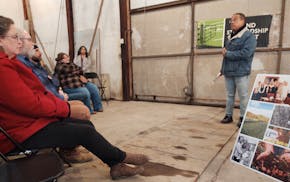BATTLE LAKE, MINN. – The middle-age man had a stubborn, almost joyous look on his face, and you could tell he was going to get his way no matter who had to suffer.
The restaurant hostess was the one who suffered.
He lashed into her in a belittling tone of voice. Tears ran down her cheeks as he sat back down in the restaurant lobby, arms folded. The man wanted one thing: to be seated in the outdoor patio. NOW. Never mind there wasn't room. Never mind there were other people waiting to be seated. Nobody in his party intervened; possibly they were used to his behavior. Possibly they thought it was an appropriate way to speak to someone they considered a social underling.
I suffered, too. For the poor young hostess, trying to keep it together on a busy night. For the man, who apparently didn't realize how bad he looked. I didn't know where the guy was from, but his clothes and demeanor indicated city. I felt a pang for the Twin Cities or whatever urban area he hailed from. It was where I grew up and where I sometimes treated people just as badly, blasting my horn at other drivers without fearing I'd ever see them again.
So I get it. I get the expectation of quick and stellar service every time. I get the hatred of waiting, because in the city, it feels like you're always waiting — for lights to change, for your turn at the DMV, and heaven forbid that you're caught in traffic at Xcel Center on game night.
They talk about an urban-rural divide — economic, political — and maybe patience is another. We here in rural America are accustomed to waiting for plants to grow, for livestock to mature, for the fish to bite. A place steeped in farming culture places less importance on instant gratification, on rushing and rushing, unless the corn is ready to combine and there's snow in the forecast. Waiting provides a chance to think about things, to observe the world around you, to breathe.
I said some comforting words to the hostess. I don't remember what they were. "It's not your fault," maybe, or "Ignore him." Then my party was seated at a booth while the man's party continued to wait in the lobby.
Now that summer is well underway in greater Minnesota, tourists are flooding into all regions of the state. From Memorial Day to Labor Day, they will fill the restaurants and hotels, line the streets of small towns for parades and swell the audiences of community theater. The dollars they bring help pay for rent or tuition or groceries. These dollars are meaningful, and this column is not intended to diminish the importance of tourism or tourists in greater Minnesota. For every sourpuss, there are a dozen happy campers.
I just ask that kindness prevail.
Summer tourism brings urban and rural together like no other time of the year. It's a chance to get to know each other, to listen to each other's perspective, to absorb new ideas and build respect for the places we are from. It can be used to heal our divides, to realize that we're all Minnesotans and we're all in this together.
Greater Minnesota is more than spectacular waterfalls or wake surfing or tubing. Greater Minnesota is also the people who live here year-round and who are often scraping by financially or are working toward big dreams of our own or are worried about a loved one who has been depressed and has to wait a month to see a therapist.
The guy in the Battle Lake restaurant and others like him need to understand that nobody is a social underling. You realize that when you live in a rural area. The people who serve you food might also respond when you're trapped in a wrecked vehicle. A teacher during the school year may clean cabins in the summer. The food vendor at the festival might also be a pastor who will recount your bad behavior to his congregation as an example of turning everything over to God.
People who live in small towns in greater Minnesota year-round know this already. It's part of the social contract. You never know who is related to who or who you might need to rely on someday.
It's not all perfect out here; there are cliques and gossip and drama. But out-and-out cruelty in a public place will get you ostracized pretty quickly. If you've been cruel to an EMT, they will still help you the best they can. But you'll feel pretty small while they're doing it.
Tolkkinen: By going after Canada, Trump shows he doesn't understand friendship

Tolkkinen: Democrat Keith Ellison visits Trump country

Tolkkinen: My column on transgender athletes drew insults, outrage and applause
Tolkkinen: Surrounded by crops in Minnesota farm country, but with little to eat


